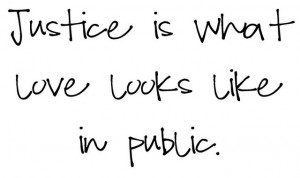Amos 8:1-12
 This past week I had the opportunity to visit harambee. Harambee is the morning assembly when everyone gathers to start the day at Freedom School, and each day there’s a different visitor who gets to read to the kids. I was invited to be the reader on Wednesday. So, I stood off to the side in South Hall and watched the kids and staff go through their morning routine. I saw chants and cheers celebrating the unique gifts of members of the group, and I saw two of the kids, called by name and asked to stand, then complimented for their behavior the day before during their field trip to the Bronx Zoo. At every opportunity the group would break into their “good job!” chant you just heard, and they even did it for me when I finished reading.
This past week I had the opportunity to visit harambee. Harambee is the morning assembly when everyone gathers to start the day at Freedom School, and each day there’s a different visitor who gets to read to the kids. I was invited to be the reader on Wednesday. So, I stood off to the side in South Hall and watched the kids and staff go through their morning routine. I saw chants and cheers celebrating the unique gifts of members of the group, and I saw two of the kids, called by name and asked to stand, then complimented for their behavior the day before during their field trip to the Bronx Zoo. At every opportunity the group would break into their “good job!” chant you just heard, and they even did it for me when I finished reading.
As I watched them finish up harambee, I turned to several Riversiders who were there volunteering and asked, largely hypothetically: “I wonder what would happen if all of our committee and commission meetings were filled with celebration, affirmation, and all of us telling each other: ‘good job’ over and over again?”
That would change a lot, we decided. Because in every human community there is not nearly enough generous affirmation, encouragement, listening, and celebration in our interactions with each other, is there? Somewhere along the line we forget this lovely, positive way we teach our children to behave in human community, and, friends: the effects of that forgetting are tragic. We saw it AGAIN this week…in violent acts in France and Turkey, in police wearing riot gear in our city streets, in hateful, despicable words about testing, registering, and deporting Muslims in this country. God has shown us how to behave, the prophets would say: to act justly, to love mercy, to walk humbly with God, and when we don’t, when we won’t…over and over and over again…well, we know from the biblical witness: that God will not hesitate to get political.
Today is the second in a three-week sermon series on the lectionary texts from the prophets Amos and Hosea, and we’re thinking about what happens when God gets political—as God does over and over in the prophetic texts.
Our modern word “politics” or “political” comes from a Greek word that means something like “of, for, or relating to citizens.” I would venture to say at this time in history, you and I are watching a political landscape unfold before our eyes in which politics does not mean “of, for, or relating to citizens,” but something more like “the cynical pursuit of influence and power over other people.” And it seems to me that God may have some concerns about this behavior trend, because we see in scripture over and over and over again that God is deeply invested in the state of our human life together. So when we talk about what happens when God gets political, we’re talking not about the kind of politics we’ll surely see in Cleveland this week but rather about God chiming in to give on opinion on matters of, for, or relating to citizens: the state of our corporate life.
We find ourselves again today in the book of the prophet Amos. You’ll remember from last week that the prophet Amos didn’t start out to become a prophet—he was a herdsman and a dresser of sycamore trees who lived in the south, the country of Judah. By the time Amos was preaching, recall, the Jewish people had split into two separate monarchies, Judah to the south and Israel to the north, so instead of God’s people having one corrupt and inept king, they now had two. The people had all but abandoned the laws of Yahweh, who had brought them out of slavery into Egypt and invited them to live in community that reflected fundamental guidelines by which common life should be ordered: love of God and love of neighbor.
So God kept sending prophets to tell them to shape up, one of whom was Amos. Amos had visions telling him to cross the border into the north and send the people a message, but it wasn’t going too well for the newly-recruited prophet. Interruption after interruption, nobody was listening, and the fabric of society was just unraveling all around him. The poor were getting poorer, and those with power gobbled up everything they could with greed, eliminating even fundamental safety nets in Jewish society. “I am holding up a plumb line in the midst of my people…” Amos prophesied last week. A leveling tool. Something is crooked—terribly, terribly wrong. You have to fix it!
Well, this week the prophet Amos comes with another message. This time it is not a plea to be kind to each other or to start acting with fairness and justice, or else. No, this week Amos shows up and says “The Lord appeared to me and asked me: ‘Amos, what do you see?’ And I saw a basket of summer fruit. And then the Lord said to me: ‘The end has come upon my people Israel; I will never again pass them by…the songs of the temple will become wailings, and I will say: BE SILENT!’”
God was done.
You might wonder what a basket of summer fruit has to do with God reaching his limit. The original Hebrew in this text is a pun, a play on words. The Hebrew word used in the text here was pronounced differently in Judah, the south, and Israel, the north. In the south, where Amos was from, the word was pronounced “kai-its,” which means “summer fruit.” In the north, the region where Amos was preaching, the word was pronounced “cates,” which meant: “the end.”[1] Amos the prophet had shown up that day to tell the people that this was the end of the road. God wasn’t interested any more in begging them to turn around and care for their common life—it was clear that they would not.
And God was done with these people who couldn’t care for each other, done with the perpetual choosing of power over justice, done with the poor being trampled and the vulnerable cast aside, done with the hate-filled way they kept on treating each other. So God got political and said: it ends here. I’ve had enough.
When I was a little kid I learned a song in Sunday school that went something like this (don’t worry, I won’t sing it): “Love, love, love. That’s what it’s all about. ‘Cause God loves us, we love each other, mother, father, sister, brother. Everybody sing and shout! ‘Cause that’s what it’s all about…”. Anybody know this song? God is love; it’s a lesson we teach our children, and it’s true. The problem with that song and with our own understanding of God’s love is that we—especially, if I may say so, more moderate or liberal people of faith—cook down the fierce love of God, we just boil the wrath of God right off, until we’re left with a kind of shallow, impotent, teddy bear kind of God that we can take out and cuddle when we feel sad or especially self-righteous, a God whose love is “mere sentimentality.”[2] But the God we meet here in the book of Amos and in many places in the biblical text is definitely not a God of sentimentality. He is a God of righteous anger, of wrath, even.
Now, confession: the wrath of God is not really a go-to topic for most preachers I know. But in a world filled with oppression, poverty, violence—we have to understand that God is always on the side of the oppressed, outraged at the injustice we perpetrate on each other, filled with righteous anger. God is certainly love, but true love is more than just accepting everybody; the flip side of that love, what gives it heft and the power to change things, is it’s perpetual insistence on justice. Liberation theologians call it a “preferential option for the poor.” Dietrich Bonhoeffer said that love without this kind of justice is “cheap grace.” And Union professor, father of black liberation theology, and regular Riversider Jim Cone says we have no time for a neutral God. “The wrath of God is the love of God in regard to the forces opposed to liberation of the oppressed.”[3]
We would do well to remember that God’s justice in this world will never be thwarted by our ongoing choices to hurt, oppress, marginalize, and dominate each other. No, God’s justice will roll down like waters and righteousness like an ever-flowing stream, but if we don’t get on board we will be left behind when God gets fed up and says: that’s enough. I’m tired of your behavior.
Listen to the prophet Amos: “The time is surely coming, says the Lord God, when I will send a famine on the land; not a famine of bread, or a thirst for water, but of hearing the words of the Lord. They shall wander from sea to sea, and from north to east; they shall run to and fro, seeking the word of the Lord, but they shall not find it.”
This is not God threatening natural disaster here: a punitive, sully God who is just going to punish us because he can. This is God saying that he will not spend any more time asking us—begging us—to act justly, to love mercy, to walk humbly with God. This world needs healing and God needs partners to enact the radical justice of love. And if God’s words keep falling on deaf ears… if we won’t get on board, well then the holy wrath of God’s love will say: enough. You will look for the word of the Lord, but you will not find it. I will look for justice-making partners somewhere else.
“Well, this is all very well and good,” I can hear us all thinking, “but I can’t stop a terrorist from driving a truck into a crowd of people, and I didn’t have one thing to do with the deaths of 49 people in Pulse nightclub in Orlando, and I would never support policies to register and deport Muslims, and I support #BlackLivesMatter and ending police brutality against people of color in this country. There’s nothing I can do about that kind of grand scale hatred and oppression!” That may be true, and it can lead us to stare at the television in disbelief, again, and to feel deeply, desperately hopeless.
But, while we may never be in a position to stop a terrorist attack or correct a systemic injustice once and for all, I tell you: we can decide how we will live here and now, in this community and in all the communities of our lives where we can choose to behave with justice, mercy, humility, and love. We can ask ourselves if we treat our neighbors with love, and if not, why? We can look at our own racism and privilege and check ourselves. We can be quiet and listen. We can act always with a generosity of kindness. We can tell the truth. We can show up, and we can help someone who needs help. Every day. Because the God who has called us—each one of us—to the work of healing the world will keep asking us to tend our relationships and our communities with extreme care; the devastating results of any neglect are all over the news.
Love, love, love. That’s what it’s all about. The fullness of God’s love, a love that stubbornly refuses to leave the least of these behind and demands right behavior and just action with uncompromising urgency.
All of us who can hear the voice of the prophet calling us to justice and mercy and peace and love, we had better step up and start living that way: in here and out there, because God is a God of love, and when God gets political the fierce justice of that love will say to all of us who refuse to change the way we behave: that is enough. I’ve had enough.
Amen.
[1] https://www.workingpreacher.org/brainwave.aspx?podcast_id=781
[2] James Cone, God in Black Theology, 70-78.
[3] Ibid., 75.












